The Seventh Seal (Det Sjunde Inseglet) is a 1957 Swedish film written and directed by Ingmar Bergman. Set in Sweden during the Black Death, it tells of the journey of a medieval knight and a game of chess he plays with the personification of Death, who has come to take his life.
Ingmar Bergman’s films dealt with pain and torment, desire and religion, evil and love. In the mid-1950s, the threat of nuclear Armageddon lurked in the background of everyday life, like the plague that ravages Medieval Sweden in the film. By shifting the existential questioning to a Medieval setting, Bergman lightens the intellectual load on the viewer, shying from attacking modern ideologies.
In his films, “this world is a place where faith is tenuous, communication, elusive, and self-knowledge, illusory at best,” Michiko Kakutani wrote in The New York Times Magazine in a 1983 profile of the director. God is either silent or malevolent; men and women are creatures and prisoners of their desires. The Seventh Seal as a title comes from the Book of Revelation:
“And when the Lamb opened the seventh seal, there was silence in heaven about the space of half an hour. And the seven angels who had the seven trumpets prepared themselves to sound.” — Revelation 8:1
Here the motif of silence refers to the “silence of God” which is a major theme of the film.
“Since at this time I was still very much in a quandary over religious faith, I placed my two opposing beliefs side by side, allowing each to state its case in its own way. In this manner, a virtual cease-fire could exist between my childhood piety and my newfound harsh rationalism. Thus, there are no neurotic complications between the knight and his vassals. Also, I infused the characters of Jof and Mia [some might say Joseph and Mary] with something that was very important to me: the concept of the holiness of the human being. If you peel off the layers of various theologies, the holy always remains.”
— Ingmar Bergman, “Images: My Life in Films”
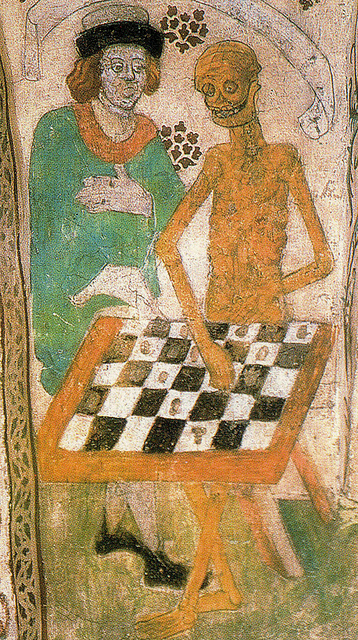

“The Seventh Seal is one of the few films really close to my heart. Actually, I don’t know why. It’s certainly far from perfect. I had to contend with all sorts of madness, and one can detect here and there the speed with which it was made. But I find it even, strong, and vital. (…) The final scene when Death dances off with the travelers was shot at Hovs hallar. We had packed up for the day because of an approaching storm. Suddenly, I caught sight of a strange cloud. Gunnar Fischer [the cinematographer] hastily set the camera back into place. Several of the actors had already returned to where we were staying, so a few grips and a couple of tourists danced in their place, having no idea what it was all about. The image that later became famous of the Dance of Death beneath the dark cloud was improvised in only a few minutes. That’s how things can happen on the set. We made the film in thirty-five days. (…)
“I had recklessly dared to do what I wouldn’t dare to do today. The knight performs his morning prayer. When he is ready to pack up his chess set, he turns around, and there stands Death. ‘Who are you?’ asks the knight. ‘I am Death.’ Bengt Ekerot and I agreed that Death should have the features of a white clown. An amalgamation of a clown mask and a skull. It was a delicate and dangerous artistic move, which could have failed. Suddenly, an actor appears in whiteface, dressed all in black, and announces that he is Death. Everyone accepted the dramatic feat that he was Death, instead of saying, ‘Come on now, don’t try to put something over us! You can’t fool us! We can see that you are just a talented actor who is painted white and clad in black! You’re not Death at all!’ But nobody protested. That made me feel triumphant and joyous.”
— Ingmar Bergman, Images: My Life in Films
“I wrote this film to conjure up my own fear of dying. Death was therefore to have a starring role and was to take part from the very beginning. And then I was considering–I knew that the knight and Jöns were traveling through a plague-infected landscape. And so I contemplated in what situation this knight would meet death. It was very natural for me to think of Albertus Pictor’s painting. He was the famous medieval church painter. There’s a painting that depicts Death playing chess with a knight. So it all came naturally. [I haven’t seen this film in] a very long time. I don’t watch my own movies very often. I get–I get nervous and start to cry. I need to pee and feel miserable. It’s terrible. But the way I remember it–I don’t know how many films I’ve made. Maybe around 50, if you count those made for TV. Somewhere between 50 and 60. If I say I’ve made ten good films, that I feel I can stand up for, I think The Seventh Seal is among them. Yes, I’m certain of it.”
— Ingmar Bergman, interview with Marie Nyreröd (2003)
Director: Ingmar Bergman
Screenplay: Ingmar Bergman, based on his play, Trämålning [“Wood painting”]
Cinematography: Gunnar Fischer
Antonius Block: Max von Sydow
Squire Jöns: Gunnar Björnstrand
Jof: Nils Poppe
Mia: Bibi Andersson
Death: Bengt Ekerot
Plog: Åke Fridell
Lisa: Inga Gill
Jonas Skat: Erik Strandmark
Raval: Bertil Anderberg
Mute woman: Gunnel Lindblom
Witch: Maud Hansson
Karin, Block’s wife: Inga Landgré
Church painter: Gunnar Olsson
Monk: Anders Ek
Updated 22 July 2023

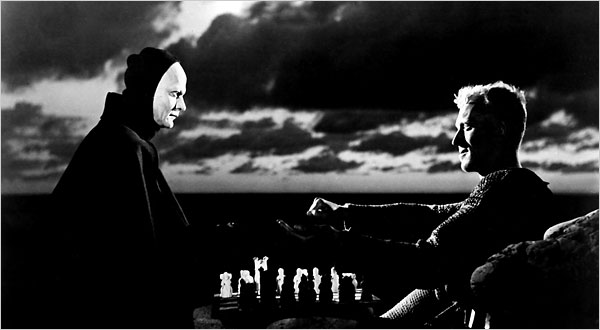

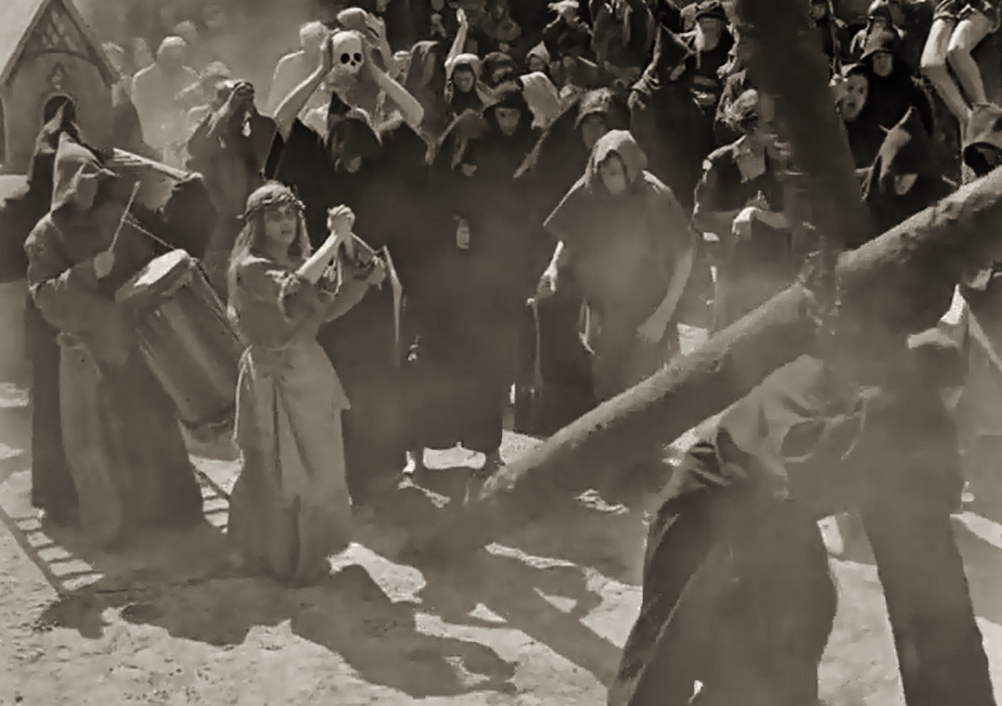

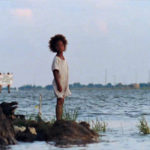

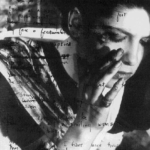
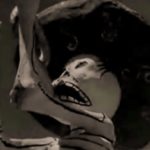






Pingback: B. Traven's "Macario" - Magical Realism on Day of the Dead | WilderUtopia.com
Pingback: Orson Welles: Tragic Hero, Sacred Monster, Profane Clown | WilderUtopia.com
Pingback: Ongoing Reconsideration of Pier Paolo Pasolini | WilderUtopia.com
Pingback: ‘Solaris’ – Tarkovsky’s Vision Beyond an Urban Future